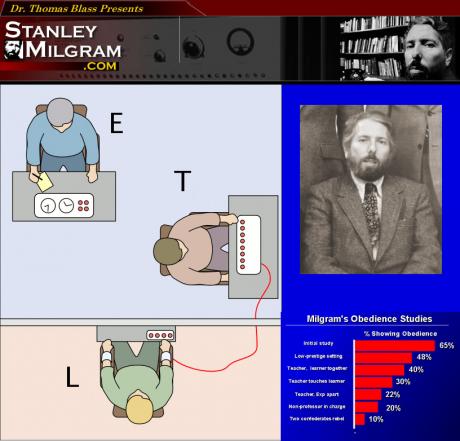Milgram's obedience studies - not about obedience after all?
Christian Jarrett
Stanley Milgram's seminal experiments in the 1960s may not have been a demonstration of obedience to authority after all, a new study claims.
Milgram appalled the world when he showed the willingness of ordinary people to administer a lethal electric shock to an innocent person, simply because an experimenter ordered them to do so. Participants believed they were punishing an unsuccessful 'learner' in a learning task; the reality was the learner was a stooge. The conventional view is that the experiment demonstrated many people's utter obedience to authority.
Attempts to explore the issue through replication have stalled in recent decades because of concerns the experiment could be distressing for participants. Jerry Burger at Santa Clara University found a partial solution to this problem in a 2009 study, after he realised that 79 per cent of Milgram's participants who went beyond the 150-volt level (at which the 'learner' was first heard to call out in distress) subsequently went on to apply the maximum lethal shock level of 450 volts, almost as if the 150-volt level were a point of no return [further information]. Burger conducted a modern replication up to the 150-volt level and found that a similar proportion of people (70 per cent) were willing to go beyond this point as were willing to do so in the 1960s (82.5 per cent). Presumably, most of these participants would have gone all the way to 450 volts level had the experiment not been stopped short.
Now Burger and his colleagues have studied the utterances made by the modern-day participants during the 2009 partial-replication, and afterwards during de-briefing. They found that participants who expressed a sense that they were responsible for their actions were the ones least likely to go beyond the crucial 150-volt level. Relevant to this is that Milgram's participants (and Burger's) were told, if they asked, that responsibility for any harm caused to the learner rested with the experimenter.
In contrast to the key role played by participants' sense of responsibility, utterances betraying concern about the learner's wellbeing were not associated with whether they went beyond the 150-volt level. Yes, participants who voiced more concerns required more prompts from the experimenter to continue, but ultimately they were just as likely to apply the crucial 150-volt shock.
However, it's the overall negligible effect of these experimenter prompts that's led Burger and his team to question whether Milgram's study is really about obedience at all. In their 2009 partial-replication, Burger's lab copied the prompts used in the seminal research, word-for-word. The first time a participant exhibited reluctance to continue, the experimenter said, 'Please continue'. With successive signs of resistance, the experimenter's utterances became progressively more forceful: 'The experiment requires that you continue'; 'It is absolutely essential that you continue'; and finally 'You have no other choice, you must go on.'
Burger's revelation (based on their 2009 replication) is that as the experimenter utterances became more forceful - effectively more like a command, or an order - their effectiveness dwindled. In fact, of the participants who were told 'you have no choice, you must continue', all chose to disobey and none reached the 150-volt level. 'The more the experimenter's statement resembled an order,' the researchers said, 'the less likely participants did what the experimenter wished.' It would be interesting to learn if the same pattern applied during Milgram's original studies, but those results were not reported here, perhaps because the necessary data are not available.
Burger and his colleagues said their new observation has implications for how Milgram's studies are portrayed to students and the wider public. Their feeling is that Milgram's results say less about obedience and rather more about our general proclivity for acting out of character in certain circumstances. 'The point is that these uncharacteristic behaviours may not be limited to circumstances in which an authority figure gives orders,' Burger and his team said. 'Few of us will ever find ourselves in a situation like My Lai or Abu Ghraib. But each of us may well encounter settings that lead us to act in surprising and perhaps disturbing ways.'
_________________________________
Burger, J., Girgis, Z., and Manning, C. (2011). In Their Own Words: Explaining Obedience to Authority Through an Examination of Participants' Comments. Social Psychological and Personality Science DOI: 10.1177/1948550610397632
More on Milgram:
Milgram's personal archive reveals how he created the 'strongest obedience situation'.
Classic 1960's obediency experiment reproduced in virtual reality.
http://bps-research-digest.blogspot.com/2011/02/milgrams-obedience-studies-not-about.html
www.psychspace.com心理学空间网

